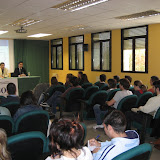Lessons about Open Data at the Open Government Data Camp in London
 After changing my agenda, last week I was finally able to attend the second day of the Open Government Data Camp held in London. In addition, invited by the Open Knowledge Foundation I was privileged to be present at the press conference which announced the release as raw data of the database containing all the UK Government expending over 25,000 pounds (about 29,000 Euros).
After changing my agenda, last week I was finally able to attend the second day of the Open Government Data Camp held in London. In addition, invited by the Open Knowledge Foundation I was privileged to be present at the press conference which announced the release as raw data of the database containing all the UK Government expending over 25,000 pounds (about 29,000 Euros).The event where the announcement of the release was made was presented and explained by Minister Francis Maude escorted by Professor Nigel Sadbolt, Tom Steinberg, Rufus Pollock ... and Tim Berners-Lee, inventor of the web and advisor to the British Government. It is highly recommended to watch the video of David Cameron as a lesson on Open Government. This video was the opening of the event, so we must assume that the Prime Minister "wanted to be" there.
Despite being "only" an official announcement, there were a few things that caught my attention and I'd like to share, just in case we can be inspired in Spain, and perhaps in other countries:
- It was not a typical press conference, at least as we know them in Spain. I mean, it was not a long speech of the minister, followed by questions from reporters. Instead, it was organized as very short presentations about many important points around the matter of the announcement, both political and operational and even technological.
- There were presentations from all the organizations that had been involved in the project and not just from the government. Representatives from mySociety, the Transparency Board and the OKF, made their points. But there was also an important space reserved for independent software developers such as Chris Taggart, who had been working in a demo of the possibilities of the data released.
- The wide technological culture that exhibit the members of government, including the Prime Minister. Comparisons are odious, so I will not make any. This is an exercise for you.
- The commitment of UK Government to transparency and open data is remarkable. "We know this will be a very uncomfortable process within the government departments" said Maude. In fact, uncomfortable news began to circulate during the event, such us the payments to Nick Clegg's wife's law firm or the rents paid to Prince Charles from the Ministry of Justice. But the commitment is as firm as defined by the words of Francis Maude “It is our ambition to make the UK the most transparent and accountable Government in the world"
"It's very encouraging to see that UK government is becoming more radical than me in terms of open data and transparency"Thanks to the OKFN for the great work organizing the Open Government Data Camp and in particular to Jonathan and Rufus himself for pursuing my attendance at the event. I hope that all the networking and interaction and the envy and inspiration that gives the speed at which things are developing there, allows us to COPY in Spain and create a true Open Data community. I believe we have the grounds, but we need a little more action, less complacency ... and some more reusable raw data.
About OGDCamp sessions, I'll write another post as this is becoming a bit heavier than I'd like to :) I recommend you check out the hashtags #openuk and #ogdcamp and conclusions of the working groups.
PS: On my way back to Valladolid, I read at the airport that the Government of Spain had released the draft Royal Decree implementing Law 37/2007 of 16 November, on reuse of public sector information and launched a public consultation on it. Personally I prefer the approach of less regulation and more publishing of open data as raw data, but still congratulations on the move. As soon as I can read it in detail I will try to make my contribution.









